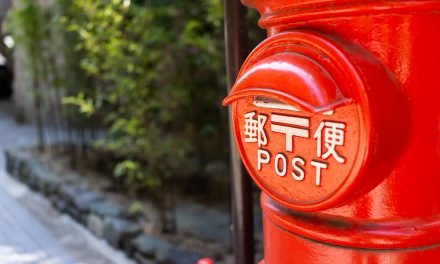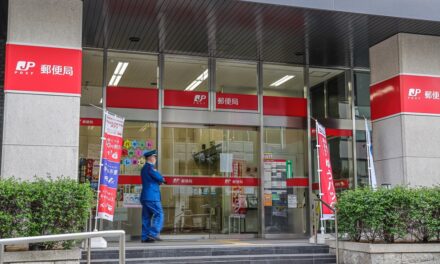
JAPANESE POSTAL WORKERS WIELD BIG CLOUT
JAPANESE POSTAL WORKERS WIELD BIG CLOUT LETTER CARRIERS STAND IN WAY OF REFORM-MINDED CANDIDATE
From SAN JOSE MERCURY NEWS, April 23rd, 2001
By MICHAEL ZIELENZIGER, Mercury News Tokyo Bureau RELATED STORY: Page 14A
Two or three times a day, the postmaster in this mountain hamlet of 400
residents in central Japan gets into his Toyota sedan to pick up special
delivery from loyal, elderly women such as Toshiko Kamikubo. But don't mistake Special Postmaster Masakazu Katsumata for Federal
Express. He doesn't touch parcels, or even deliver mail. His mission today is
to pick up a thick stack of bills totaling $82,000 in cash that Kamikubo wants
deposited in a branch of Japan's largest bank: the post office. Japanese postal workers like Katsumata have a great deal of local
influence, and they have formed a powerful force that is fighting to block the
rise of reformer Junichiro Koizumi, the leading contender to become Japan's
next prime minister when the ruling Liberal Democratic Party meets Tuesday. Koizumi has called for privatizing the postal services, including the
postal savings system. He says private banks should take the massive pool of
savings to reduce the size of government spending, and that private delivery
services should compete for the mail service. Though many economists in Japan believe the nation must embrace fundamental
economic reform if it is ever to regain its economic stride, many doubt the
LDP can take up that cudgel because it is so beholden to myriad special
interests. One of these interests is the postal service, which collects more than a
third of the nation's savings and funnels it into government-backed loan and
building projects that keep the troubled construction sector afloat. The power of the post office illustrates how difficult change can be in
Japan. The postmasters have created a nationwide support network that draws on
their extraordinary service and long tradition to defend against change in a
nation that tends to shy away from conflict and place value on maintaining
long-term relations. Influential groups Koizumi, 59, a former health and welfare minister, is running on a platform
of ''change Japan by changing the LDP.'' He is one of four candidates for the
next leader of the LDP, and thus prime minister of the world's second largest
economy. This race won't be decided by the Japanese people at large, but by a vote
of LDP legislators and regional party representatives. To a great extent, the
campaign revolves around what to do about Japan's decadelong economic
downturn. But many of the candidates advocate policies that would keep alive
some of the party's most troubled special interests, including debt-plagued
banks and failing construction companies. None of the influential interest groups that make up the LDP is more
motivated to fight Koizumi than the postal workers, and their effective
network and fierce opposition could block him from becoming the next prime
minister. ''Everybody knows me,'' said Katsumata, 50, who inherited the job as
''designated postmaster'' of Gora from his father and grandfather and is a key
member of the local chapter of the LDP. He collects the prodigious savings of the Japanese people and puts them
into postal savings and insurance accounts. Customers deposit their savings
loyally, even though they earn very little because of the country's record-low
interest rates. ''People want safety,'' said the postmaster. ''If we privatize postal
services, some isolated branches would be closed and rural people would be
inconvenienced. If it's privatized, this would become a business. I think
that's risky.'' Katsumata declined to talk about his political activities. But some 250,000
members of an LDP support group made up of current and former postal workers
strongly oppose Koizumi's privatization plan and support his chief opponent,
Ryutaro Hashimoto, a former prime minister. The group, known as Taiju, has
become the largest support group among the 2.37 million rank-and-file members
of the LDP. ''Patronage politics is crucial to a vote like this,'' said Steven Reed, a
professor of political science at Chuo University. The postal workers ''are a
really important, solid support group for the LDP with a national network.
They could be crucial.'' Whoever emerges as prime minister must lead the party into legislative
elections in July that the LDP appears likely to lose. Koizumi seems to be the popular choice among independent voters. Loyal support Hashimoto, his main opponent, is counting on help from groups such as the
postmasters to cut Koizumi's margin of support at the regional level, so he
has made the post office privatization a major campaign issue. ''Hashimoto is worried that party members can't deliver the votes they way
they used to,'' said Gerald L. Curtis, a Columbia University expert on
Japanese politics and author of ''Election Campaigning, Japanese Style,'' who
is teaching in Tokyo. ''In really rural districts, it's the postmen who really
deliver the vote, but there's leakage even there.'' In the past few days, according to domestic news media, postmasters and
retired postmasters have been collecting blank ballots distributed to
partymembers, and returning them with Hashimoto's name written in. One party
member recounted how a postmaster, his brother-in-law, demanded that he hand
over his blank ballot, to ensure that Hashimoto's name appeared on it. Photo PHOTO EMI DOI — KNIGHT RIDDER
Postmaster Masakazu Katsumata, left, talks with mail deliverer Yaso Suzuki in
Gora, Japan, on Friday. Postal workers have great local influence.
Copyright 2001, San Jose Mercury NewsSAN JOSE MERCURY NEWS, 23rd April 2001












